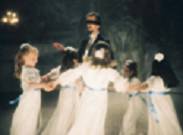|
|
||||
|
|
by Donald Levit  Only the second live-action feature from prolifically experimental Pennsylvania-born London-based identical twins Stephen and Timothy Quay, The Piano Tuner of Earthquakes exhibits more than a common share of pretense and will probably not fare well with the general public. However, for cultists of a certain bent, for those who appreciate the elaborate hoax of Poe’s Narrative of A. Gordon Pym and Eco’s The Island of the Day Before, or echoes from classics like expressionistic The Cabinet of Dr. Caligari, The Bride of Frankenstein, and Rupert Julian’s The Phantom of the Opera, not to mention The Wizard of Oz, the present film is not without interest. Melodrama both in the root sense of the word and its current usage, with a splash of Grand Guignol, medieval drôlerie and sixteenth century Low Country painting, the result is best pictured as dream-theater. Shot largely on a Leipzig soundstage, in Hi-Def spliced with Nikon still camera animation, back- or sidelit in muted brown-blue-white veering into brief sepia b&w, it is meant to be suggestive rather than denotative, “metaphor[ical] for Droz’s world -- an allegory of madness.” But since allegory is nothing if not one-to-one clear, with madness a polar opposite in lacking daylight logic, the center cannot hold in this ultimately unsatisfactory offering. In this world where “these things never happen but always are,” pencil-thin piano tuner Felisberto (Sarachu sans facial hair) is summoned to a remote sandcastle villa fronted with murals out of Brueghel and housing cunning miniature machinery. No pianos there, the “job worthy [his] services” is, instead, to fine-tune the tiny flywheels, gears, ratchets and rods that impart movement to awful, half-glimpsed faces of automata in liquids behind dirty glass. The place, which perhaps is intended to be the mind, lies in mountains near a lake so big as to seem a sea on whose artificial waves little machine men row in fleeting visions. From time to time blue-veiled Malvina sits entranced above a narrow beach, while behind her birch trees replicate in flashes a perversion of Dorothy’s Tin [Woods]Man and are tiptoed through by the half-dozen mechanically moving “gardeners” who wordlessly attend to the domain. Awaiting “all that’s left . . . the timing,” Droz lords it up, aided by ex-lover/housekeeper Assumpta (Assumpta Serna), alternately his bondage-dressed black queen and a coy seductress for the guileless newcomer fix-it man. Feeling as though he has stepped into a painting or that he has been here before, Felisberto falls asleep voice-overing his commonplace book, does not catch the portentous (and pretentious) hints sprinkled by housekeeper and doctor, and learns -- or is purposely led to half-learn -- that which he never understands. The audience does not understand, either, although the point may well be precisely that, as in pre-analysis dreams, one is meant to experience but not apprehend in the manner of normal day-to-day affairs. All invitations RSVP’d, the quaintly formal guests carry their shoes up from the lake to an outdoor stage where the “dead” prima donna will revive the host’s musical career. But a lunar eclipse and simulacrum rerun of More narrating voice, Droz sprouting an ant’s forehead spike, a confession regarding the automata, the chapel-structure of perhaps the seventh such mechanical marvel sinking through nature’s eruptive forces, and a lone boat on deceptively calm waters. Is the doctor a “healer,” as claimed, or charlatan, and the place “an asylum or rather a sanctuary [where] after a while you get used to the confusion”? And the whole, is it a tease of an anti-movie or, for most, an exercise in empty technique? (Released by Zeitgeist; not rated by MPAA.) |
||
|
© 2026 - ReelTalk Movie Reviews Website designed by Dot Pitch Studios, LLC |



